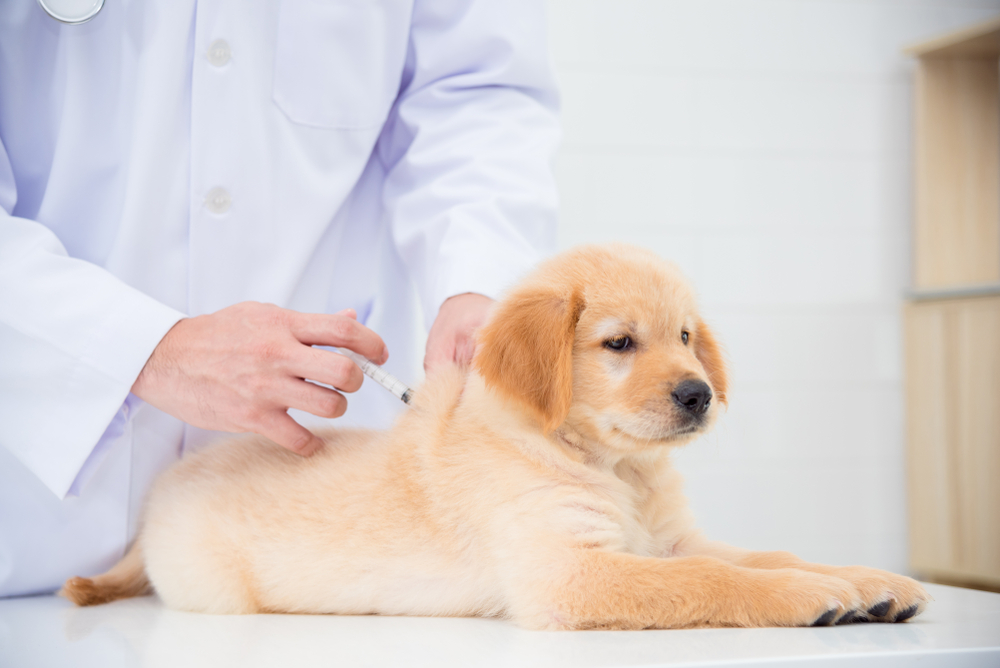Poor Puppy—9 Parvo Fast Facts

Parvovirus, or parvo, is a highly contagious virus that primarily affects unvaccinated and incompletely vaccinated puppies. With treatment, 90 percent of puppies survive, but many others suffer a terrible death. Bayside Animal Hospital has compiled nine fast facts about this preventable virus. We want to keep puppies healthy, and make parvo a thing of the past. Here are the facts:
#1: All dogs are at risk
Parvovirus can infect any dog, but is most common in unvaccinated or incompletely vaccinated puppies from 6 weeks to 6 months old. German shepherds, dobermans, American pit bull terriers, English springer spaniels, and rottweilers have a higher susceptibility, although the reason for that is not fully understood.
#2: Canine parvovirus has no cure
Veterinarians can provide supportive care to alleviate nausea, vomiting, and diarrhea, resolve dehydration and electrolyte imbalance, and prevent secondary infections. However, ultimately, the puppy has to rely on their own strength to withstand the virus and respond to medical assistance, making each case a wait-and-see prognosis. Puppies who do not respond with a positive white blood cell response by 24 hours after starting treatment tend to have poor outcomes.
#3: The virus can survive for long periods
Parvo can survive indoors for two months and outside for months to years without desiccation. The virus is resistant to cold, heat, humidity, and pH changes, as well as many common cleaners and disinfectants. Once parvo exists in an environment, eradication is incredibly difficult.
#4: Parvo is transmitted in numerous ways, including wildlife
Parvo is primarily passed by the fecal-oral route, as infected dogs shed viral particles through their stool. Parvo can remain infectious in dog feces for up to six months at a stable temperature, and also can live on inanimate objects such as clothing, shoes, dog toys, food bowls, and leashes. Puppies suspected of parvo, and their waste, should be isolated from other dogs. Veterinary hospitals with parvo cases maintain strict isolation protocols with parvo patients, to prevent an outbreak.
However, keeping a puppy away from other dogs may not provide full protection, because wildlife, especially canids such as coyotes, wolves, and foxes, are susceptible to infection and can shed the virus in the environment. Always prevent puppies from coming into contact with wildlife excrement, or an unknown animal’s feces.
#5: Puppies with parvo can decompensate quickly
Puppies with parvovirus initially appear lethargic, with no appetite, but in 24 to 48 hours will vomit and have bloody diarrhea. Parvo is rapidly fatal without medical intervention, and some puppies do not survive, despite aggressive support. At the earliest indication of illness, call Bayside Animal Hospital and bring in your puppy for parvo testing.
#6: Puppies can be tested for parvo
Your puppy should be brought to the veterinary hospital for assessment and testing anytime parvo is suspected. A convenient fecal test can determine if the puppy is shedding parvovirus antigen in their stool. If the test is positive, our veterinarian will recommend blood work to check electrolytes, hydration, and white blood cell counts, to determine the disease severity.
#7: Canine parvovirus is much more than diarrhea
Parvovirus is a ruthless, aggressive virus that attacks a puppy’s bone marrow and destroys the architecture of their intestinal lining, making absorbing nutrition impossible. The intestinal lining layers slough off like sheets—the primary reason for parvo’s trademark bloody diarrhea. One form of parvovirus can leave puppies with irreparable heart muscle damage.
The damaging effects or complications of parvo are typically the cause of death, rather than the virus itself. Intussusception, the telescoping of a piece of intestine into itself, is a common cause of death. Corrective surgery can be attempted by removing the damaged portion of intestine, but with the high risk of secondary infection, and sometimes widespread vascular damage, the surgery is not always successful.
#8: Vaccines are incredibly effective, but must be completed
Current guidelines recommend that puppies be vaccinated every three to four weeks until 16 weeks of age. Puppies who have not nursed from their mother are more vulnerable, because they do not inherit passive immunity through the milk. Like all vaccines, the parvo vaccine is only effective if your puppy receives the complete series.
#9: Parvo can be prevented
Do not allow your puppy to come in contact with unfamiliar dogs, their feces, or wildlife scat. Avoid high-traffic areas, like dog parks, where the other dogs’ vaccination and infection status is unknown. The American Veterinary Society of Animal Behavior recommends that puppies have at least one parvo vaccination seven days prior to socialization in safe settings, such as puppy classes.
If you have more questions about your puppy’s parvo risk, or to schedule a puppy vaccination appointment, call Bayside Animal Hospital. Do not risk your puppy succumbing to this awful disease.


